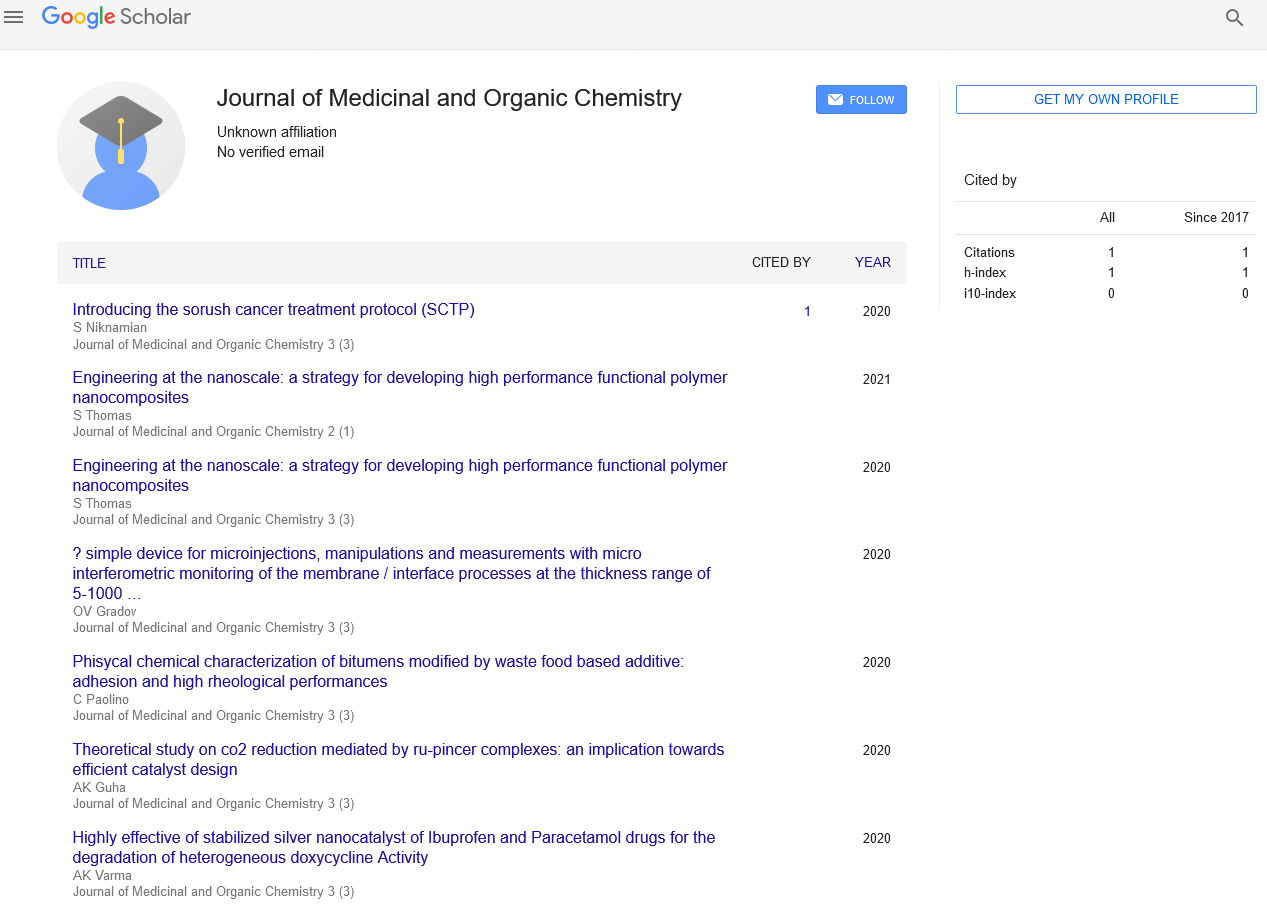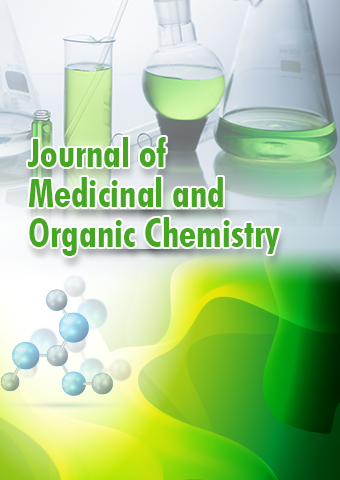Perspective - Journal of Medicinal and Organic Chemistry (2024) Volume 7, Issue 6
Drug Discovery through Organic Chemistry: Unveiling the Future of Medicine
- Corresponding Author:
- Tesleem Babalola
Department of Organic Chemistry,
University of Temisek,
Tampines,
Singapore
E-mail: tesleembaba@s.med
Received: 03-Jul-2024, Manuscript No. JMOC-24-140617; Editor assigned: 08-Jul-2024, PreQC No. JMOC-24-140617 (PQ); Reviewed: 22-Jul-2024, QC No. JMOC-24-140617; Revised: 02- Dec-2024, Manuscript No. JMOC-24-140617 (R); Published: 30-Dec-2024, DOI: 10.37532/jmoc.2024.7(6).265-266
Introduction
In the realm of modern medicine, drug discovery stands as a cornerstone of innovation, driven by the principles and advancements in organic chemistry. This pivotal field not only elucidates the intricate mechanisms of biological processes but also empowers scientists to design and develop therapeutic agents that combat diseases more effectively than ever before.
Description
Understanding drug discovery
Drug discovery is a complex and meticulous process aimed at identifying chemical compounds that have the potential to treat diseases. It encompasses several stages, from initial target identification to clinical trials and eventual approval for use in patients. Organic chemistry plays a central role in this journey, providing the fundamental principles and tools necessary to synthesize, modify and optimize these compounds for specific therapeutic purposes.
The role of organic chemistry
Organic chemistry, the branch of chemistry that focuses on carbon-based compounds, underpins much of drug discovery. Its principles guide scientists in understanding the Structure-Activity Relationships (SAR) of molecules, which are crucial for designing drugs that interact effectively with biological targets while minimizing side effects. Organic chemists systematically modify lead compounds, altering functional groups or molecular scaffolds to enhance potency, minimize toxicity or improve pharmacokinetic properties (how drugs are absorbed, distributed, metabolized and excreted in the body).
Synthesis of bioactive compounds: The ability to synthesize complex molecules is a cornerstone of organic chemistry. Chemists use a variety of synthetic techniques to create novel compounds or modify existing ones to enhance their biological activity. This process often involves designing molecules that mimic natural substrates or disrupt specific biochemical pathways implicated in diseases.
Structure-Activity Relationship (SAR) studies: SAR studies are vital in drug discovery as they explore how changes in a molecule’s structure affect its biological activity. Organic chemists systematically alter the chemical structure of lead compounds to optimize properties such as potency, selectivity and metabolic stability. This iterative process refines candidate molecules into potent drug candidates ready for further development. Advancements in analytical techniques, such as Nuclear Magnetic Resonance (NMR) spectroscopy and mass spectrometry, provide detailed insights into molecular interactions. Computational methods, including molecular modeling and virtual screening, complement experimental approaches by predicting how molecules might bind to a target, accelerating the discovery process.
Medicinal chemistry approaches: Medicinal chemistry integrates organic chemistry with pharmacology, biochemistry and computational methods to design drugs with optimal therapeutic profiles. Rational drug design techniques, such as molecular modeling and computational chemistry, aid in predicting how a drug will interact with its target and optimize its pharmacokinetic properties.
Innovations driving drug discovery
Recent advancements in organic chemistry have revolutionized drug discovery, paving the way for more efficient and targeted therapies across various disease areas:
Combinatorial chemistry: Combinatorial chemistry accelerates the synthesis and screening of vast libraries of chemical compounds. By automating the synthesis process and screening for biological activity in high-throughput assays, researchers can rapidly identify lead compounds with therapeutic potential.
Peptide and protein therapeutics: Organic chemistry techniques have enabled the development of peptide and protein-based therapeutics. These molecules, once considered challenging to synthesize and deliver, now benefit from improved synthetic methods and formulations, expanding treatment options for conditions such as cancer and autoimmune diseases.
Natural product derivatives: Natural products, sourced from plants, fungi and marine organisms, have long served as inspiration for drug discovery. Organic chemistry facilitates the synthesis and modification of natural product derivatives, enhancing their therapeutic efficacy and overcoming limitations related to supply and complexity.
Challenges and future directions
Despite its successes, drug discovery faces several challenges, including:
Target identification and validation: Identifying relevant biological targets and validating their role in disease pathways remains a bottleneck.
Drug resistance: The emergence of drugresistant pathogens and cancers necessitates ongoing innovation in therapeutic strategies.
Safety and toxicity: Ensuring drug safety and minimizing off-target effects through precise molecular design continues to be a priority.
Looking ahead, organic chemistry holds promise in addressing these challenges through interdisciplinary collaborations, advanced computational tools and innovative synthetic methodologies. The future of drug discovery lies in harnessing these capabilities to deliver personalized medicines and targeted therapies that improve patient outcomes and quality of life.
Conclusion
Organic chemistry remains at the forefront of drug discovery, driving innovation and transformation in modern medicine. By leveraging its principles and techniques, scientists continue to expand the frontiers of therapeutic possibilities, offering new hope for treating diseases that once seemed insurmountable. As we navigate the complexities of disease biology and therapeutic efficacy, organic chemistry stands as a beacon of progress, shaping the future landscape of medicine one molecule at a time.

